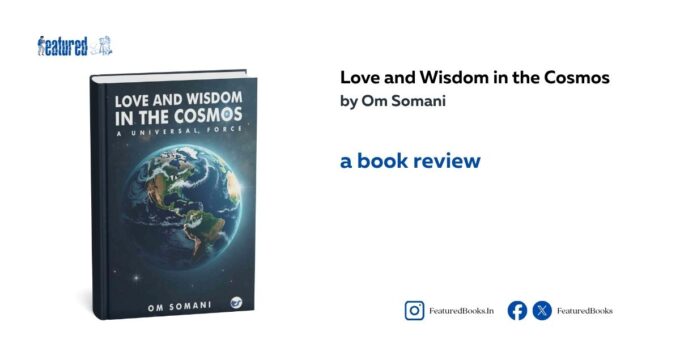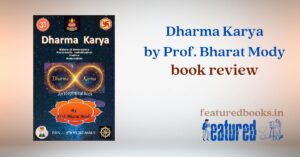In an intellectual climate often characterised by fragmentation and hyperspecialization, where the domains of science, philosophy, and spirituality rarely engage in meaningful dialogue, Om Somani’s “Love and Wisdom in the Cosmos: A Universal Force” emerges as a work of profound synthesis and audacious scope. This is not merely another entry in the popular science or spiritual wellness genres. It is a meticulously constructed philosophical argument, a grand unified theory of meaning that seeks to heal the fundamental rupture between our scientific understanding of the world and our deepest intuitive and ethical yearnings. Somani, with the authoritative grounding of a professional geologist, does not ask us to choose between the data-driven narrative of cosmology and the wisdom-laden insights of ancient Vedic philosophy. Instead, he masterfully demonstrates that these are not competing narratives but complementary strands of a single, magnificent story, one in which the universe and our planet are not inert accidents but expressive, intelligent, and fundamentally loving participants in the drama of existence. The book’s power lies in its ability to be both rigorously logical and deeply poetic, challenging the reader to expand their definition of concepts like intelligence, sentience, and love to encompass the cosmos itself.
The book’s argument is built on impeccable scientific credibility, its first and most crucial strategic strength. Somani begins with what he knows best: the Earth. But he immediately reframes the geological discipline from a study of passive matter to an exploration of active, intelligent processes. He guides the reader through the evidence not as a mystic would, but as a scientist who has looked at the same data through a wider, more holistic lens. The relentless churn of plate tectonics, which builds mountains and reshapes continents, is presented not as a blind mechanical force but as a planetary-scale expression of renewal and creativity. The Earth’s precise axial tilt, which gifts us the stabilising rhythm of the seasons, becomes a lesson in dynamic balance. The planet’s intricate, self-regulating systems for maintaining atmospheric composition and temperature are described with the awe one might reserve for a vast, conscious being managing its own life support. This is the core of Somani’s method. He does not dismiss or contradict empirical observation. He recontextualises it. By the time he introduces the formal concept of the Gaia hypothesis, the reader has already been led to the inescapable intuition that the Earth behaves as a living, sentient entity. This grounding in the tangible and the observable makes the subsequent, more expansive philosophical leaps feel earned and reasonable, rather than like speculative fancy.
From this solid earthly foundation, Somani makes his most radical and transformative proposition: that love is a universal, fundamental energy, as real and pervasive as gravity or electromagnetism. This is the philosophical heart of the book and its most significant contribution to contemporary thought. In our conventional framework, love is a psychological state, a social bond, or a biochemical reaction, confined to the realm of living, feeling creatures. Somani systematically dismantles this anthropocentric prison. He argues that the attraction binding protons and electrons in an atom, the gravitational pull holding galaxies together, and the symbiotic relationships defining ecosystems are all manifestations of this same universal force of love. It is a single, coherent energy expressing itself across different scales of complexity, from the subatomic to the galactic. The chemical bonds that form molecules are, in his view, a literal, physical expression of this cosmic attraction. This reconceptualisation is revolutionary because it provides a metaphysical bridge between the “is” of science and the “ought” of ethics. If love is indeed a fundamental principle of the universe, then our human impulse to connect, to nurture, to create, and to care for one another and our world is not a fragile cultural construct or a biological fluke. It is an alignment with the most basic, creative law of existence. This realisation carries an immense psychological and ethical weight, transforming our sense of place in the cosmos from one of alienation to one of profound, inherent belonging.
This unifying principle allows Somani to navigate the historically fraught relationship between scientific and spiritual cosmologies with extraordinary grace. His correlation of the Big Bang theory with the Vedic concept of Hiranyagarbha, the golden womb, is not presented as a direct one-to-one correspondence but as a stunning convergence of intuition and reason. He treats the ancient Vedas not as literal scientific texts but as profound works of cosmological philosophy, which arrived at deep truths through contemplation and insight —truths that our modern instruments are only now corroborating. The Vedic vision of the cosmos, infused with consciousness and characterised by the dynamic, paradoxical force of Shiva — representing both the explosive energy of creation and the still ground of being —becomes a robust philosophical framework that gives meaning to the cold equations of physics. Similarly, the Sun is reimagined from a mere celestial furnace into a “cosmic father,” a partner in a sacred relationship with Earth, whose light is an active, sustaining form of love. The more speculative exploration of a “cosmic family” and the influence of planets through the lens of Vedic astrology will likely be the book’s most contentious aspect for scientific purists. Yet, even here, Somani’s intent seems less about asserting literal astrological influence and more about using this ancient system as a metaphorical language to restore a sense of personal connection and relational belonging within a vast, seemingly impersonal cosmos.
I must confess that my first encounter with this book was met with a deep-seated, almost instinctual scepticism. As someone trained to value empirical evidence and logical positivism, the title itself felt like a red flag, suggesting a kind of soft-focused, sentimental spirituality that I have always found intellectually unsatisfying. The opening chapters, with their talk of Earth’s “love” and “care,” initially struck me as a potentially problematic anthropomorphism, a projection of human feelings onto blind natural processes. I was preparing for a read that would require me to suspend my critical faculties. However, as I progressed, a slow and profound shift occurred. Somani’s methodical, evidence-based approach, which began with his own geological expertise, started to dismantle my resistance. The logic was too coherent, the observations too keenly noted to be easily dismissed. The concept of love as a universal force, which I had initially baulked at, began to appear not as a flight of fancy but as the most elegant and parsimonious explanation for the pervasive interconnectedness and creative synergy I could see everywhere in nature. It was less a process of being convinced by argument and more one of having a latent, unarticulated understanding suddenly brought into sharp, lucid focus. The feeling was not one of seduction by a beautiful idea, but of intellectual revelation, as if a missing piece of a puzzle had been slotted into place, making sense of the whole picture.
This personal, internal shift mirrors the book’s ultimate call to action, which is its ethical and emotional culmination. Having established a worldview in which the Earth is a sentient, nurturing mother and the cosmos is a field of loving intelligence, Somani’s final movement is to outline “The Responsibility of Love.” This is where the book’s philosophical framework translates into a powerful, practical imperative. In the dominant paradigm, environmental stewardship is often framed as a burden, a necessary sacrifice driven by guilt, fear, or pragmatic calculation about survival. Somani’s vision transforms this entirely. If we are the recipients of continuous, intelligent care from a planetary being, then our response must be one of reciprocity. Caring for the Earth becomes an act of relationship, a natural expression of gratitude and love within a cosmic family. This reframing is potent because it taps into a more profound and sustainable motivation than fear. It invites us to move from a relationship of domination and extraction to one of mutual respect and nurturing. The idea that “each day is a birthday” perfectly encapsulates this ethos, urging a daily practice of renewal, gratitude, and purposeful action that aligns our personal lives with the grand, cyclical rhythms of a loving cosmos.
In conclusion, “Love and Wisdom in the Cosmos: A Universal Force” is a rare and monumental work that succeeds not by providing simple answers, but by offering a richer, more coherent, and ultimately more beautiful set of questions. It is a testament to the power of interdisciplinary thinking and a courageous challenge to the rigid boundaries that have long compartmentalised human knowledge. Om Somani has not written a perfect book, if by perfect one means a text that will satisfy every sceptic on every point. Some will find the astrological elements a bridge too far. Yet, its actual value lies in its totality, in the grand, sweeping architecture of its argument. It functions as a lens, and once you have looked through it, the world is irrevocably changed. The ground feels more alive, the sunlight feels more intentional, and our own human capacity for love feels less like a solitary struggle and more like a conscious participation in the universe’s most fundamental and creative work. It is a visionary work with the potential not only to change minds but also to heal the profound sense of disconnection plaguing the modern world, pointing the way toward a future built on the timeless, universal pillars of wisdom and love.
Get a copy from Amazon India – click here to buy now.
Review by Parakashtha for Featured Books





